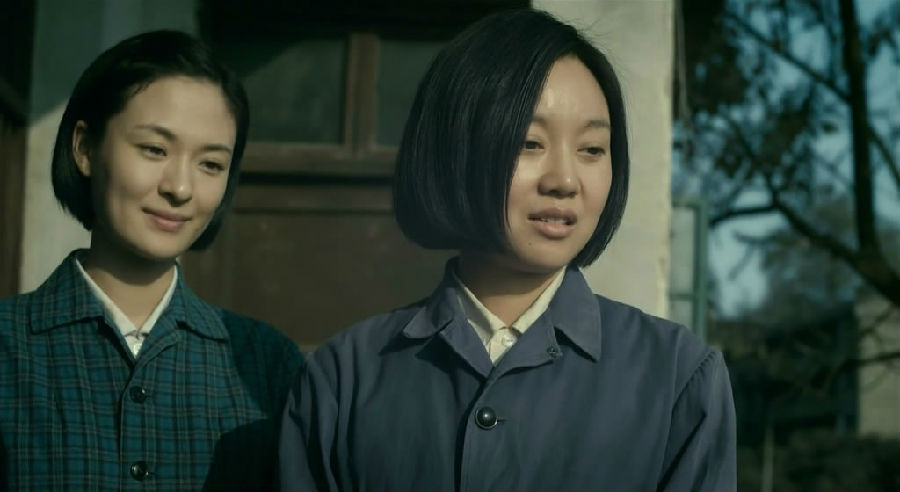
【电影简介】
1975年,在西南的一个山区小镇,一个以上海人为主的国营工厂里,王憨与八拉头,小老鼠,卫军几个好伙伴一起在子弟小学里读书。王憨因为做广播操的姿势准确,被老师选为学校的领操员。老师希望王憨在领操时可以穿得漂亮点。王憨跟妈妈要一件新衬衣,妈妈不答应。妈妈想确定王憨有没有说假话,找老师了解情况。在学校里看到王憨做操的情形时,触动了妈妈,她拿出家里不多的布票,帮王憨买了布,连夜做好了新衬衣。王憨为此骄傲了一回。在河边玩耍的时候,王憨的衬衣被水冲走,误以为是伙伴们嫉妒,与大家顶嘴,众人不欢而散。王憨从河里捞起了衬衣,怕妈妈责骂,准备等衬衣晾干以后再回家。工厂里的民兵追赶一个受伤的青年谢觉强,谢觉强在河边碰见王憨。为了止血,谢觉强顺手将王憨的衬衣一把抓过,然后躲进了草丛里。王憨想要回衬衣,追进了草丛里。谢觉强告诉王憨自己杀了人,让王憨不要告诉别人,并答应以后还王憨一件新的衬衣。王憨将遇到“杀人犯”的事情告诉了伙伴们,小老鼠又将此事告诉了大人。谢觉强被抓走。暑假到了,王憨跟着父亲去写生。路遇谢觉强的父亲和谢觉强的妹妹谢觉红。此时忽然下起了大雨,王憨父子俩到谢觉红家里避雨。王憨的父亲与谢觉强的父亲聊天,得知谢觉强是为了惩罚强奸妹妹的坏蛋才杀人的。王憨第一次也是唯一一次与自己的暗恋对象谢觉红在一起,感受到青春的萌动。后来王憨收到一个包裹,里面是一件新衬衣。王父与王母听王憨讲述了事情的经过,又前往监狱了解情况,知道王憨没有撒谎。王父与王母远远地望见前来探监的谢觉强的父亲和谢觉红。为了维护对方的自尊,王父与王母带着王憨从后门离开了。单位里举行宣判大会,谢觉强被判处死刑。伙伴们拉着王憨一起跑去刑场看热闹。
【音频文本】
In his semi-autobiographical movie "11 Flowers," Wang Xiaoshuai has been extremely personal in presenting the spiritual and sexual awakening of a teenager. Moviegoers may identify with the film's sentiment, but still ask for more.
The film is set in a rural town in southwest China in 1975, a year before the end of the Cultural Revolution. The 11-year-old boy Wang Han is receiving painting lessons from his father. His new artistic perspective encourages him to more closely observe the world around him, thus leading him to learn of a murder thatthe adults are gossiping about. Later, an in-person encounter with the murderer makes him contemplate the apparently peaceful – but actually tumultuous – lives of the adults' life at that time. At the same timehe is also entering puberty.
Known as one of the "sixth generation of Chinese cinema," Wang Xiaoshuai studied painting in middle schoolbefore he majored in directing at the Beijing Film Academy. The cinematography of "11 Flowers" is most impressive, and moviegoers can enjoy almost every shot like a classical painting.
Certainly the picturesque shots help viewers absorb the nuanced feelings Wang is trying to convey, but an audience needs more than just beautiful, moving pictures. Wang is perhaps best known for his sensitive portrayal of young people, and this time the hook is his personal awakening, but he falls short of the mark.
For one thing, the boy Wang Han is too mature for an 11-year-old. Portrayed as quiet and somewhat isolatedfrom his fellow playmates, the boy is often shown in close-ups staring at something in the distance and lost in thought. The director may have wished to present the character as he once was, but in doing so he has totally missed the point of awakening.
The father character is overly artsy. His longing for freedom may seem logical against the historical background, but seems odd for an obscure and ordinary man in a remote town. Moreover, his lessons on painting and Monet sound more bookish than fatherly.
Perhaps the director is occupied too much with his personal feelings. In the length of 110 minutes he takes his time showing almost every detail he could manage about the lives in a rural town in 1975. His effortcould very well appeal to the nostalgia of people who shared his experience, but for those who live outside the director's own personal experiences, the bulk of his message is lost in the distance between the viewer and the screen.
Wang has spoiled himself with "11 Flowers." The richness of personal feelings gives the movie a humanistictouch, but the lack of depth in the characters and storyline may well leave viewers wishing for more. On my scale from one to ten, "11 Flowers" gets a five.
轻松调频EZFM 微信mrweekly











